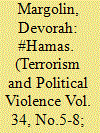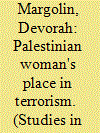| Srl | Item |
| 1 |
ID:
188068


|
|
|
|
|
| Summary/Abstract |
As the debate on whether Hamas should be designated a terrorist organization intensifies across Europe and North America, policymakers and practitioners seek to identify the core principles that unify the group and its ideology. This paper contributes to this discussion by examining how Hamas uses Twitter to frame its narrative to English-speakers around the world. From March 2015 until November 2019, when its account was suspended from Twitter, Hamas operated an English-language Twitter handle under the name @HamasInfoEn. Using thematic content analysis to explore the first 2,848 tweets sent by Hamas in English—between March 2015 and March 2018—this paper explores the socio-political and religious narratives that lay at the core of Hamas’s online public diplomacy throughout its first three years on Twitter. Since its entrance into politics in 2006, some academics argue that Hamas has increasingly sought to distance itself from acts of terrorism and legitimize its actions as a governing actor, thereby seeking to carve out a place for itself in the international community. This study presents a nuanced understanding of how Hamas represents itself internationally, to better understand where the group is going, and how to best counter its narratives.
|
|
|
|
|
|
|
|
|
|
|
|
|
|
|
|
| 2 |
ID:
147065


|
|
|
|
|
| Summary/Abstract |
This article analyzes a novel comprehensive database of attacks by Palestinian women between 1965 and 1995. During this period, women's participation in terrorism evolved and their participation can be divided into two distinct eras, before and after 1986. The article argues that the entrance of religious terrorist organizations into politics and the First Intifada changed Palestinian terrorism. While more attacks by women occurred after 1986, they were mostly low intensity attacks, aimed at military targets, with low success rates. Despite women's participation, the patriarchal structure of society is also reflected in Palestinian terrorist organizations. However, as women's roles in society expanded, so too did their roles within terrorist organizations.
|
|
|
|
|
|
|
|
|
|
|
|
|
|
|
|